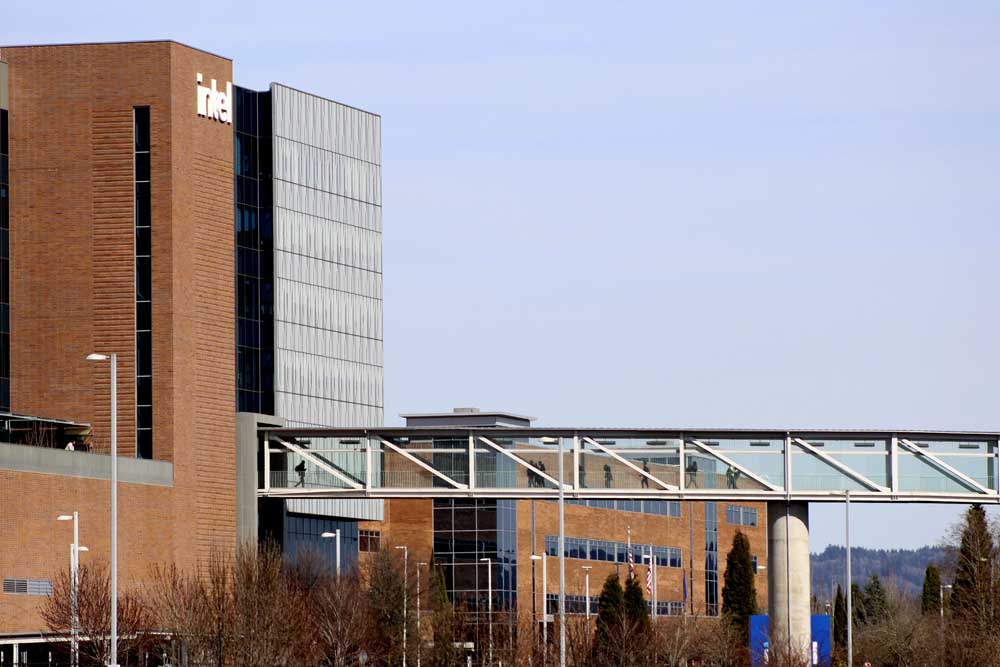Intel finalizes $7.9 billion in federal subsidies for scaled-back expansion
Published 2:22 am Tuesday, November 26, 2024

- Workers walk on a skybridge to and from a large Intel facility in Hillsboro in 2023. The federal government announced on Tuesday that Intel would get $7.9 billion in federal subsidies.
Intel and the Biden administration have finalized terms for $7.9 billion in federal subsidies for the company to build, expand and modernize factories in Oregon and three other states, the Commerce Department announced early Tuesday.
While Intel will get the first $1 billion from its award by the end of the year, its total package is $600 million less than the $8.5 billion Intel and the Commerce Department agreed to when they announced preliminary terms in March. And the administration said Intel opted not to pursue $11 billion in federal loans that were part of the March announcement.
Administration officials said they adjusted the subsidies downward to account for the impact of a separate, $3 billion deal announced in September to have Intel make chips for the Defense Department.
But the diminished terms of Tuesday’s deal also reflect Intel’s deteriorating outlook. The chipmaker is slowing the pace and scale of its investments, with lukewarm sales unable to support the rapid, $100 billion factory buildout Intel anticipated as recently as last spring.
That puts the Biden administration in the politically awkward position of awarding cash to a company that’s laying off workers and delaying construction plans. The deal includes $1.9 billion for Intel’s research factories in Hillsboro but leaves the pace and timing of the planned Oregon expansion unclear.
Intel eliminated 15,000 jobs across the company this fall, including 1,300 layoffs in Washington County. The chipmaker is trimming $10 billion from its 2025 budget and badly needed the federal money as it plays catch-up to industry leader Taiwan Semiconductor Manufacturing Co.
Tuesday’s award comes from the 2022 CHIPS Act, bipartisan legislation that allocated $52 billion to support domestic semiconductor manufacturing. Advocates said the U.S. needed to revive its chip industry and be less reliant on technology made in Asia.
“After a 30-year dip the industry’s coming back and these facilities are going to fundamentally change chip manufacturing and the strength of the chips industry in the U.S. and in the process create tens of thousands of good-paying jobs for Americans,” Commerce Secretary Gina Raimondo said in a media briefing.
Intel CEO Pat Gelsinger, who became increasingly critical of the Biden administration during the eight months between the preliminary announcement and Tuesday’s final award, hailed the ultimate result.
“Strong bipartisan support for restoring American technology and manufacturing leadership is driving historic investments that are critical to the country’s long-term economic growth and national security,” Gelsinger said in a written statement.
President-elect Donald Trump has been critical of the CHIPS Act even though he supported similar initiatives during his first administration. With Biden set to leave office in January, both Intel and the outgoing administration faced a deadline to finalize their deal or leave it to an uncertain fate with Trump.
Tuesday’s agreement represents the largest sum awarded under the CHIPS Act and a welcome infusion of money for Intel, which is facing one of the greatest crises in its five-decade history.
The market for Intel microprocessors, used in PCs and data centers, has stalled as companies shift their focus to artificial intelligence — a segment where Intel has little traction. And with its production technology trailing rivals’, Intel has had limited success finding clients for its nascent contract manufacturing business.
Intel has shelved plans for factories in Israel, Germany and Poland indefinitely.
It’s going ahead with two new factories in Arizona, a major overhaul of its factories in New Mexico, and it still plans two new factories in Ohio.
But the Ohio factories won’t open next year, as originally planned. The company is delaying construction while it awaits a hoped-for revival in demand for its products. Tuesday’s deal commits Intel to opening one Ohio factory by 2030 but allows for the possibility the second might open later, perhaps much later, if Intel’s sales can’t justify the spending.
Tuesday’s announcement also describes “modernization” of Intel’s existing factories in Hillsboro, which are already the company’s most advanced. But there’s no indication of whether Intel plans to go ahead with a major expansion, adding a fourth phase to its D1X research factory near Hillsboro Stadium.
Intel did not respond to a message seeking an update on its plans.
The company has a separate deal with Oregon for $115 million in state subsidies to expand its Hillsboro footprint. That agreement commits Intel to adding nearly 2,600 jobs through expansion by early 2029.








